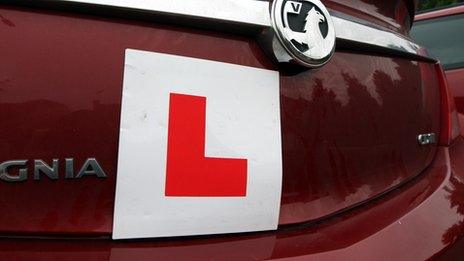Unmasking the driving test cheats
- Published

Driving tests are a fraught necessity for UK residents who want to drive legally on the nation's roads - but they can also be a money-spinner for organised crime gangs.
Some people who do not believe they can pass the test - or those who simply want the UK driving licence document without the effort - are prepared to pay hundreds of pounds to cheat the system.
And it is not just the practical test that falls prey to fraudsters; the theory examination has proved open to abuse.
This risk to British roads is taken very seriously by the Driving Standards Agency (DSA) and its team of 30 fraud investigators.
Behind an unassuming smoked glass door in Nottingham the team's leader, Andy Rice, describes the problem of fraud as "significant" and "serious".
He investigates driver impersonation - where stand-ins take tests in place of learners - illegal instructors who are not registered to teach, and corrupt translators who provide the correct answers in exchange for cash.
"Because of the sums involved some people will go to great lengths for this fraud," Mr Rice said.
People will pay about £800 for someone else to take their theory test or about £1,600 to be impersonated in the practical test, he said.
"Gangs see it as a nice earner and when we started a gang could do 200 to 500 tests before they were caught."
Drugs and guns
One of the first convictions involved an estimated £1m made in impersonations.

Andy Rice said the DSA oversees about 1.5 million practical driving tests each year
Mr Rice said gangs "employ" eight to 10 people with "different looks" to match the learner's provisional licence photograph.
Evidence of money laundering, drug and gun trafficking has been be found at the homes of arrested suspects, he said.
Mr Rice managed the investigation that led last month to Britain's first jail sentence for an interpreter, who helped about 200 people to cheat the driving theory test.
Chinese interpreter Peter Hui was sentenced to 12 months in prison for correcting answers in tests between 2011 and 2012 in Birmingham.
A few weeks later Mandarin translator Allyson Ng was jailed for 12 months for cheating on at least 94 theory tests between 2009 and 2012, mainly in Cardiff.
Taxi trouble
Although a rare fraud, with five translators prosecuted to date, its impact is significant: for each corrupt translator the number of people who pass with that person's help can be in the hundreds.
In the first case of its kind, in 2004, an interpreter speaking Tigrinya (a language from Ethiopia and Eritrea) was shown to have given answers in 562 tests.
His fraud was committed mainly in London and Birmingham.
The Midlands has featured in all the cases where translators have been prosecuted for fraud.
In February the government launched a consultation into ending foreign language assistance for the UK driving test.
Road safety minister Stephen Hammond said, in addition to the possibility of fraud, allowing interpreters created a potential safety risk, due to people being able to pass the test but not understand important traffic updates.
In July two examiners, an instructor and seven candidates were sentenced after a three-year investigation into fraud in Warwickshire.

Examiners are trained to identify attempted fraud in practical driving tests
And cheating is not confined to the standard driving licence test.
The DSA is investigating an Urdu translator suspected of helping bus and lorry drivers cheat on theory tests in the West Midlands.
John Fothergill, former chairman of the Private Hire Drivers Association in Coventry, said cheating is well known to taxi drivers.
Until he left five years ago he worked alongside the Taxi Licensing Department in the city.
He said: "I heard of people using mobile phones and sending text messages to get answers in the [taxi] written exams, some drivers definitely got through without all the knowledge they needed to do the job."
Mr Rice said the public can help to tackle fraud by ensuring driving instructors are registered with the DSA, which ensures they are competent and checked.
"The best way to be assured learners are safe is to check the green DSA registration badge on the instructor's windscreen.
"Instructors are in a position of trust, a lot of learners are young adults and for those who operate illegally, without a CRB check, who knows what their background is," he added.
- Published23 July 2013

- Published16 July 2013
- Published13 February 2012

- Published5 February 2013
